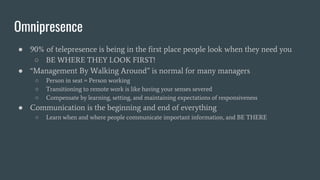How To Be A Remote Work Superhero
- 1. HOW TO BE A REMOTE WORK SUPERHERO Jon Jones, Art Outsourcing Manager jon@gameartproducer.com
- 2. ŌŚÅ Working in games since 2001 on over 50 titles across all platforms ŌŚÅ Career-long specialization in art outsourcing management ŌŚÅ Working remotely managing distributed teams since 2009 ŌŚÅ Speaker at events like XDS, GDC, SIGGRAPH, MIGS, Casual Connect, and IGDA Who is Jon Jones?
- 3. Remote Work Superpowers 1. Omnipresence 2. Super Speed 3. Omniscience 4. Vigilance 5. Foresight 6. Regeneration
- 4. Video call tradecraft ŌŚÅ Look at the camera, not their face. Eye contact is important! ŌŚÅ 10 minute cutoff for no-shows ŌŚÅ Buy and use a laptop camera cover. Always keep it closed unless youŌĆÖre on a call ŌŚÅ Stay muted unless speaking to minimize background noise ŌŚÅ Before a call, check whatŌĆÖs in the camera view and hide sensitive items ŌŚÅ Always wear pants. You can tell by their face. ŌŚÅ Screensharing advice: ŌŚŗ Hide your bookmarks bar: Ctrl-Shift-B in Chrome ŌŚŗ Check your open tabs, open windows, and desktop for sensitive or embarrassing info ŌŚŗ When possible, share only the WINDOW and not the entire SCREEN
- 5. Omnipresence ŌŚÅ 90% of telepresence is being in the first place people look when they need you ŌŚŗ BE WHERE THEY LOOK FIRST! ŌŚÅ ŌĆ£Management By Walking AroundŌĆØ is normal for many managers ŌŚŗ Person in seat = Person working ŌŚŗ Transitioning to remote work is like having your senses severed ŌŚŗ Compensate by learning, setting, and maintaining expectations of responsiveness ŌŚÅ Communication is the beginning and end of everything ŌŚŗ Learn when and where people communicate important information, and BE THERE
- 6. ŌŚÅ Identify primary comms channels: ŌŚŗ Work assignments and feedback Ō¢Ā email, Trello, Basecamp, Slack, Teams, Shotgun, Jira, etc ŌŚŗ General or technical discussions Ō¢Ā email list, Sharepoint, scheduled video calls in Zoom/Hangouts, etc ŌŚŗ Location of file share for collaborating on content and file transfer Ō¢Ā Dropbox, Google Drive, OneDrive, Aspera, Resilio Sync, etc ŌŚŗ Source control Ō¢Ā Perforce, SVN, etc ŌŚÅ Learn how people use those channels. How would you get answers? ŌŚŗ Where am I most likely to find a responsive artist or programmer? ŌŚŗ If source control is down, who do I talk to? ŌŚŗ ItŌĆÖs late, everyoneŌĆÖs offline, and I need help. Where are our shared resources? Omnipresence
- 7. ŌŚÅ 90% of telepresence is being in the first place people look when they need you ŌŚŗ BE WHERE THEY LOOK FIRST. ŌŚÅ Sometimes that's clear, sometimes you can train the team around you. ŌŚÅ Always : ŌŚŗ respond quickly in the primary channels Ō¢Ā donŌĆÖt spread yourself thin across too many channels ŌŚŗ follow up when you say you will ŌŚŗ consistently use the same communication channels for the same information ŌŚÅ This doesn't mean you're on call 24/7. If your team has set core hours, work during those core hours, and don't respond outside of them. Set boundaries. ŌŚÅ Remote work on an ongoing basis is EARNED. Push for sustainable conditions. Super Speed
- 8. ŌŚÅ Take responsibility for understanding process ŌŚŗ Whose work is upstream from me? ŌŚŗ Where does my work product go next? ŌŚŗ What tools do those teammates live in? ŌŚŗ Where will highest-priority contributions be noticed first? ŌŚŗ How can my thoroughness be easy to verify? Omniscience
- 9. All information must create its own context. ŌŚÅ Document A should not require Documents B, C, and D to make sense. ŌŚÅ Use proper nouns and be specific ŌŚŗ NO: hesheitthattherethingplace ŌŚŗ YES: BobAlicefile.pdf[full path]etc ŌŚÅ Save and include images, never link. Links break! ŌŚÅ Use specific filenames and absolute folder locations in all feedback ŌŚÅ Cite all sources and references, including web links ŌŚÅ Document edge cases in a shared ŌĆ£scratchpadŌĆØ to incrementally build knowledge Omniscience
- 10. Vigilance ŌŚÅ You are now remote. You no longer have the luxury of ignoring security hygiene ŌŚÅ You do NOT want to be responsible for an easily preventable data breach a. Password Manager i. Use 1Password. Pay for it. In 2020, password managers are critical life infrastructure. ii. If you canŌĆÖt do the bare minimum to protect your lifeŌĆÖs most valuable information, why should a company trust you with their confidential information? b. Two-factor authentication app i. Use Authy. Set a backup password. If you donŌĆÖt, lost phone = permanent account lockout ii. Only use SMS 2FA if there is no other alternative iii. 2FA on ALL ACCOUNTS! c. Create a new ŌĆ£WorkŌĆØ profile in your web browser i. Create new Gmail address for work ii. Log into your browser with that profile iii. Set up sync, set up 2FA
- 11. Foresight Realistic scenarios to plan for: ŌŚÅ Power outage ŌŚÅ Internet cell service outage ŌŚÅ Hard drive crash ŌŚÅ Stolen hard drive laptop ŌŚÅ Hospital or family emergency ŌŚÅ Non-specific hardware failure
- 12. Regeneration Self-care is important! ŌŚÅ Dedicated workspace with explicit ŌĆ£on work / off workŌĆØ hours ŌŚŗ If you mix work and play areas, you will never be fully at work or at play, and youŌĆÖll grow to hate it ŌŚÅ Create daily rituals to separate yourself from work ŌŚŗ Do yoga ŌŚŗ Walk a dog ŌŚŗ Cook a meal ŌŚŗ Take language lessons (DuoLingo, 5 minutes at a time!) ŌŚŗ Podcast while you clean ŌŚŗ Develop a ŌĆ£focus time for workŌĆØ playlist
- 13. Thank you for listening! Questions?









![All information must create its own context.
ŌŚÅ Document A should not require Documents B, C, and D to make sense.
ŌŚÅ Use proper nouns and be specific
ŌŚŗ NO: hesheitthattherethingplace
ŌŚŗ YES: BobAlicefile.pdf[full path]etc
ŌŚÅ Save and include images, never link. Links break!
ŌŚÅ Use specific filenames and absolute folder locations in all feedback
ŌŚÅ Cite all sources and references, including web links
ŌŚÅ Document edge cases in a shared ŌĆ£scratchpadŌĆØ to incrementally build knowledge
Omniscience](https://image.slidesharecdn.com/2020-04-06howtobearemoteworksuperhero-200409160034/85/How-To-Be-A-Remote-Work-Superhero-9-320.jpg)



